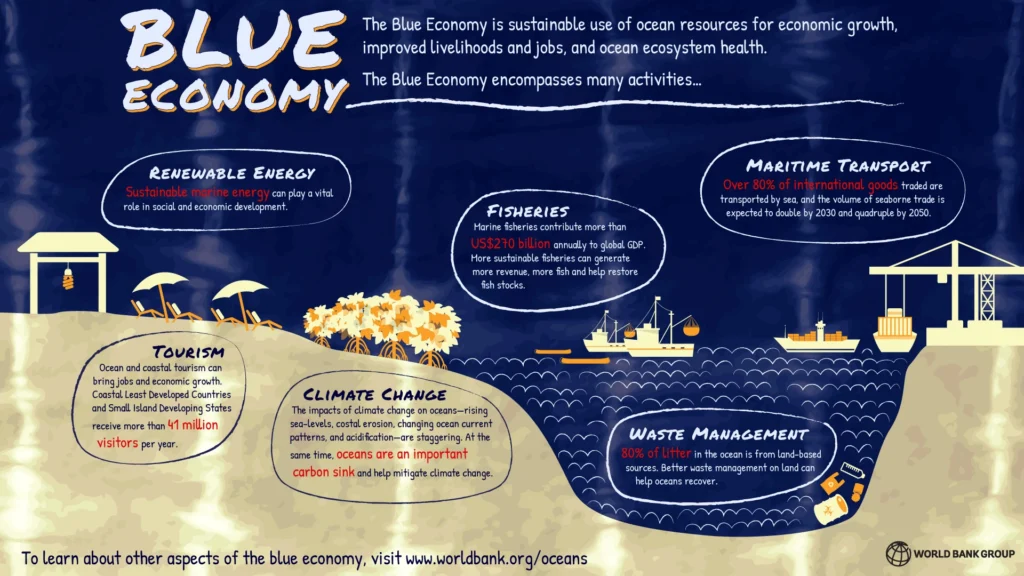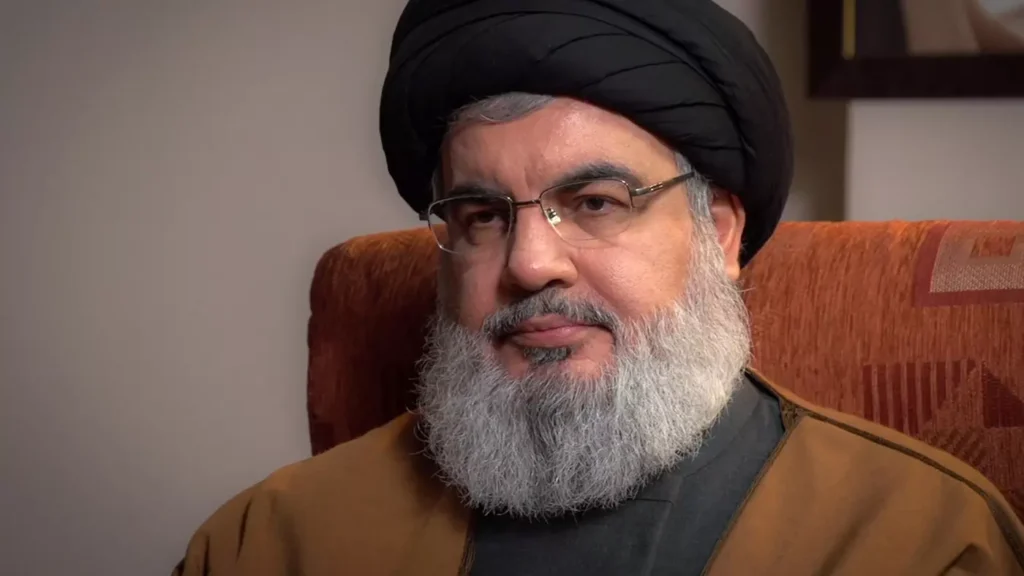
The Image of Blue Economy Concpet.
Introduction
A big transformation is imminent in the energy environment of Pakistan. Recent geological surveys have unravelled enormous offshore oil and gas reserves off its coastline. This can transform the entire energy production paradigm of the country, rejuvenating its economy and affecting global energy markets. The Blue Economy, at the core, is about transformative change through sustainable use of ocean resources for economic growth, livelihood, and jobs while ensuring the health of ocean ecosystems.
Current Energy Situation in Pakistan
It is to be noted that Pakistan faces an acute energy crisis and relies highly on the imports of energy for fulfilling its requirements. About 85% of the total crude oil and 30% of natural gas are imported, costing billions of dollars annually and worsening the budgetary deficit conditions (International Energy Agency [IEA], 2023). This dependence came with the price of strict IMF-mandated fiscal requirements that increased electricity prices by 155% since 2021, according to the IMF this year, and widely practiced fuel rationing across industries, epitomized by the steep fall in productivity within Pakistan’s textile sector, shaving over a billion dollars off its export orders, says the State Bank of Pakistan this year.
The energy deficit has also contributed to a significant downturn in foreign investment and a severe spike in the cost of living. In several cities, the cost of powering a home now tops rental expenses. This has contributed to general social unrest (World Bank, 2023). Poor policymaking, broad levels of corruption, and bureaucratic inefficiency have further hampered Pakistan’s economic stability. (Transparency International, 2023)
The Oil and Gas Discovery
Preliminary estimates put these reserves among the fourth-largest in the world, putting Pakistan between Iran’s 209 billion barrels and Canada’s 170 billion barrels of proven reserves (U.S. Energy Information Administration [EIA], 2023). Around 240 sites, that could possibly contain enormous reserves of crude oil and natural gas, have been identified in the geological survey off the coastline of Pakistan. If these reserves become commercially viable, this may substantially decrease the energy import bill of Pakistan and free billions of dollars for investment in other sectors, while foreign exchange reserves would recover accordingly (Pakistan Petroleum Limited, 2023).
The Potential Impact on Pakistan’s Economy and the Blue Economy
It is believed that exploiting the reserves of oil and gas in Pakistan-even those offshore-could drive a Blue Economy that would result in growth in the construction, logistics, and energy services sectors. This economic growth might solidify and strengthen the influence of Islamabad over the Baluchistan and Sindh provinces, effectively increasing regional stability. The World Bank (2020) points out that the Blue Economy concept focuses on the sustainable use of marine resources to ensure that economic development does not happen to the detriment of ocean health.
A balanced Blue Economy can give rise to different economic activities taken from maritime transport, fisheries, renewable ocean energy, and marine biotechnology. With proper utilization of the reserves offshore, Pakistan can achieve job opportunities, GDP increase, and sustainable development by protecting its marine ecosystems (Food and Agriculture Organization [FAO], 2018).
Geopolitical Implications
From the Chinese perspective, China is in better shape for the development of the recently discovered reserves of Pakistan, not only because of its expertise and funding capability but also because of its keen political interest in the region (Zhang & Wang, 2023). This renewed Chinese interest may well restart economic growth and catalyze further foreign investment, especially at a time when the reshaping of global supply chains and energy markets due to the Western sanctions on Russian oil and gas companies, and maritime disruptions in the Red Sea, have been initiated (International Crisis Group, 2023).
A Pakistan that can actually become a potential key supplier of energy means more competitiveness toward the already established, such as Saudi Arabia and Iran, in meeting the demand brought about by new supply chains in the transition toward renewable sources of energy globally (BP, 2023). This shift in dynamics may improve the strategic position of Pakistan within the global outlook on energy, which will further strengthen alliances and trade with countries from other parts of the world.
Challenges and Risks
Despite this promising find, there are still some factors that will likely impede the chances of Pakistan exploiting the oil and gas reserves fully. The power of security is expected to be at the front line as frequent attacks on infrastructure and foreign workers deter international investors from participating in the country’s economy. According to Asia Foundation, 2023, political instability and frequent policy reversals further worsen the investment climate, fostering wariness for substantial foreign companies (Institute of Strategic Studies Islamabad, 2023).
Besides, the initial phase of exploration requires a deposit of $5 billion-a pretty dicey gamble considering the current geopolitical and economic situation. Apparently, investor confidence and securing favourable terms form the bedrock of looking after Pakistan’s hydrocarbon industry (Asian Development Bank, 2023).
Blue Economy: Focus on Sustainable Development and Infrastructure
This applies to the formulation of sustainable infrastructure in leveraging oil and gas discovery within a Blue Economy framework. Building offshore platforms and related infrastructures along the coastline will reduce environmental impact but improve efficiency in operations. Besides this, investment in renewable ocean energy sources like offshore wind and tidal energy should be added to the traditional hydrocarbon exploitation to ensure a better energy portfolio, which is balanced and sustainable (International Maritime Organization, 2022).
Most importantly, perhaps, applying the Blue Economy to marine areas allows for protections and restoration of marine ecosystems. Combining strict regulations pertaining to the environment with the encouragement of best practices in offshore drilling will minimize ecological risks from oil and gas extraction, hence long-term sustainability and resilience of Pakistan’s marine resources.
Global Energy Market Context
The Pakistani discovery comes at a time when the global energy landscape is rapidly changing. As this transition towards renewable sources of energy gathers momentum, renewable technologies alone cannot keep pace with the high demand caused by artificial intelligence, electric vehicles, and cryptocurrencies, among others (International Renewable Energy Agency [IRENA], 2023). Situated in this context, nuclear energy is being embraced as a higher-capacity, low-emission alternative; hence, companies such as Uranium Royalty Corporation prepare for the expected increase in demand (World Nuclear Association, 2023).
Future Outlook
If Pakistan can overcome the key economic, security, and political challenges, these oil and gas reserves could still prove to be their much-needed economic lifeline. Success depends upon flawless execution in a volatile geopolitical situation. Policymakers at this juncture must ensure stability and restore investor confidence to convert this discovery into long-term economic gain.
The Blue Economy framework thus forms the paradigm that guarantees the exploitation of Pakistan’s reserves for more sustainable economic growth and environmental sustainability. Much work on infrastructure, security, and regulatory frameworks involves strategic investments to exploit this discovery to full potential.
Conclusion
The very recent discovery of oil and gas in Pakistan thus brings immense promise to transform this country into a major energy producer, with far-reaching ramifications for its economy and the global energy market. A Blue Economy approach by Pakistan will be of much help in ensuring that this transformation will indeed be sustainable and inclusive; it will make sure that economic growth is attained without sacrificing marine ecosystems. Of course, ensuring the full realization of this discovery will necessitate the overcoming of very serious challenges that lie between security, political stability, and infrastructure development. While the world is still grappling with a complex transition toward energy, the emergence of Pakistan’s role might turn out to be a missing critical piece in the global energy puzzle.
Frequently Asked Questions (FAQs)
1. What is the Blue Economy, and how does that relate to the recent oil discovery in Pakistan?
The Blue Economy is defined as the use of ocean resources in such a way that economic growth and livelihood diversification are accomplished through the creation of jobs, without compromising the health of the ocean ecosystem. A resultant discovery of oil in Pakistan will make a lot of difference in the country’s Blue Economy by supporting growth in areas such as maritime transport, fisheries, renewable ocean energy development, and marine biotechnology, ensuring that any economic benefit does not compromise marine environmental sustainability.
2. How do the newly discovered oil and gas reserves of Pakistan stand in comparison with the rest of the world?
The global positioning of the oil and gas reserves of Pakistan, ranking-wise, if the initial estimates are confirmed, would come between Iran with 209 billion barrels and Canada with 170 billion barrels of proven reserves. This would mean, if the reserves prove commercially viable, a long way toward reducing energy import dependence for Pakistan and significantly bolster its lead in the global energy market.
3. What are the major issues relating to the development of the oil and gas reserves of Pakistan?
Among these, the main ones are security concerns, political instability, frequent policy reversals, and high initial investment. Infrastructure and attacks on foreign workers have kept off many foreign investors from investing in the country. Political instability and bureaucratic inefficiency due to corruption have raised uncertainty in the minds of investors. Exploration itself demands an estimated $5 billion investment amidst geopolitical uncertainties.
4. How will the development of these oil and gas reserves affect the economy of Pakistan?
The development of these reserves could transform the economy of Pakistan through a reduction in its energy import bill, saving billions of dollars for other investment and increasing the GDP with enhanced industrial productivity. That may fire up the blue economy, too, creating jobs in construction, logistics, and energy services that strengthen regional stability.
5. What role is China playing in the development of oil and gas in Pakistan?
Given its expertise, capability for funding, and political interests in the region, China is all set to form a crucial partnership for the exploitation of oil and gas reserves in Pakistan. Finally, such renewed Chinese investment may spur Pakistani economic growth once again or attract more foreign investment in the wake of a new set of global energy dynamics and sanctions on Russian oil and gas companies in recent times.
References
Asian Development Bank. (2023). Pakistan: Energy sector overview. https://www.adb.org/countries/pakistan/energy
Asia Foundation. (2023). Security challenges in Pakistan’s energy sector. https://asiafoundation.org/pakistan/security-energy
BP. (2023). BP Statistical Review of World Energy 2023. https://www.bp.com/en/global/corporate/energy-economics/statistical-review-of-world-energy.html
Food and Agriculture Organization of the United Nations. (2018). The blue economy: Sustainable use of ocean resources for economic growth, improved livelihoods, and jobs. http://www.fao.org/3/i9540en/I9540EN.pdf
Institute of Strategic Studies Islamabad. (2023). Political instability and its impact on foreign investment in Pakistan. https://isspk.org/political-instability-investment
International Crisis Group. (2023). Global energy markets and geopolitical shifts. https://www.crisisgroup.org/global-energy-geopolitics
International Energy Agency. (2023). Pakistan energy profile. https://www.iea.org/countries/pakistan
International Maritime Organization. (2022). Sustainable practices in offshore oil and gas operations. https://www.imo.org/sustainable-offshore
International Renewable Energy Agency. (2023). Renewable energy and the future of global energy markets. https://www.irena.org/renewable-energy-future
Ministry of Energy, Government of Pakistan. (2023). Pakistan’s energy strategy and development plans. https://energy.gov.pk/strategy
Pakistan Economic Survey. (2023). Energy sector analysis and investment requirements. https://www.finance.gov.pk/survey_2023
Pakistan Petroleum Limited. (2023). Offshore oil and gas reserves discovery report. https://www.ppl.com.pk/reserves-report
State Bank of Pakistan. (2023). Economic impact of energy imports on Pakistan’s economy. https://www.sbp.org.pk/economic-impact-energy-imports
Transparency International. (2023). Corruption perceptions index: Pakistan. https://www.transparency.org/en/countries/pakistan
U.S. Energy Information Administration. (2023). Country analysis briefs: Iran and Canada. https://www.eia.gov/international/analysis/country
World Bank. (2020). The blue economy: A wealth of opportunities for small island developing states. https://documents.worldbank.org/en/publication/documents-reports/documentdetail/216571581216667092/the-blue-economy-a-wealth-of-opportunities-for-small-island-developing-states
World Bank. (2023). Pakistan economic update: Energy sector challenges and opportunities. https://www.worldbank.org/en/country/pakistan/publication/pakistan-economic-update
World Nuclear Association. (2023). The future of nuclear power. https://www.world-nuclear.org/future




Authentic one 💯